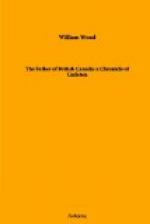What this ridiculous minority of grab-alls really wanted was not a parliament but a rump. Many a representative assembly has ended in a rump, The grab-alls wished to begin with one and stop there. It might be supposed that such pretensions would defeat themselves. But there was a twofold difficulty in the way of getting the truth understood by the English-speaking public on both sides of the Atlantic. In the first place, the French Canadians were practically dumb to the outside world. In the second, the vociferous rumpites had the ear of some English and more American commercial people who were not anxious to understand; while the great mass of the general public were inclined to think, if they ever thought at all, that parliamentary government must mean more liberty for every one concerned.
A singularly apt commentary on the pretensions of the camp-followers is supplied by the famous, or infamous, ‘Presentment of the Grand Jury of Quebec’ in October 1764. The moving spirits of this precious jury were aspirants to membership in the strictly exclusive, rumpish little parliament of their own seeking. The signatures of the French-Canadian members were obtained by fraud, as was subsequently proved by a sworn official protestation. The first presentment tells its own tale, as it refers to the only courts in which French-Canadian lawyers were allowed to plead. ’The great number of inferior Courts are tiresome, litigious, and expensive to this poor Colony.’ Then came a hit at the previous military rule—’That Decrees of the military Courts may be amended [after having been confirmed by legal ordinance] by allowing Appeals if the matter decided exceed Ten Pounds,’ which would put it out of the reach of the ’inferior Courts’ and into the clutches of ‘the King’s Old Subjects.’ But the gist of it all was contained in the following: ’We represent that as the Grand Jury must be considered at present as the only Body representative of the Colony, ... We propose that the Publick Accounts be laid before the Grand Jury at least twice a year.’ That the grand jury was to be purged of all its French-Canadian members is evident from the addendum slipped in behind their backs. This addendum is a fine specimen of verbose invective against ‘the Church of Rome,’ the Pope, Bulls, Briefs, absolutions, etc., the empanelling ’en Grand and petty Jurys’ of ‘papist or popish Recusants Convict,’ and so on.




